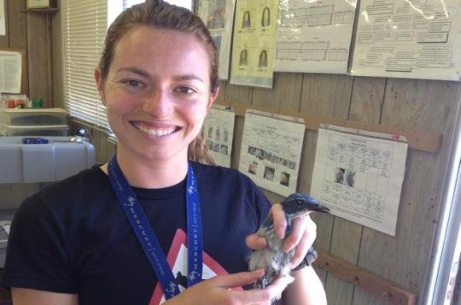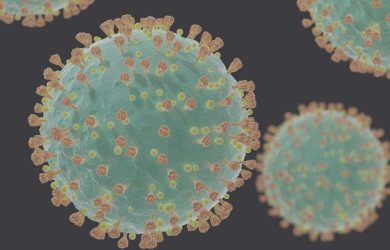
Alison Greggor is beginning a PhD studying the interaction between jackdaws and humans after doing research on the effects of tourism on dolphins in Hawaii.
Alison Greggor has been interested in the interaction between humans and animals from an early age. Whilst at high school she used to run along the trails outside her home town of Novato in California every day.
“I would jog through grasslands and wetlands on the outskirts of the town. It was full of wildlife, including coyotes,” she says. “Most people run on asphalt or treadmills so I feel I was very lucky to have such a beautiful area to run through.”
Her running routine brought together her two passions – distance running and wildlife – and since then she has pursued both to a high level.
A keen and accomplished distance runner, she has been running competitively since high school and was captain of the University of California, Berkeley, track and cross country teams.
Despite the demands of training four to five hours daily at a Division One university, she still managed to flourish in her chosen field of animal psychology. “The running routine was almost all-consuming,” she says, “but when you have more to do you find you get more done.”
Childhood
Alison was born in New Jersey, but moved to California when she was 10 and believes the move gave her opportunities which she would not otherwise have had.
Her parents, who are both English, separated when she was 15, but she says it was not an acrimonious split and both remained living in the same town.
She was always used to the outdoors life and would play outside in the woods in New Jersey. “I always found animals really interesting,” she says. “My mum was not too happy when I asked for a python at the age of seven or a pet rat, but I liked them because they were different. There was something mysterious about them.”
At school, Alison was very academic and took a lot of advanced placement [college level] classes. At university she was intending initially to major in biology, with Spanish as a minor since she wanted to learn about other cultures and she was surrounded by Latino culture in California. However, she found straight biology was not for her. She took a class in psychology and enjoyed it so started exploring different forms of psychology. She eventually settled on experimental psychology, but it was not until late on in her undergraduate degree course, after taking a class in animal cognition, that she found the subject that eventually led her to do a PhD at the University of Cambridge.
During her last year she worked in several laboratories, and did research on cultural transmission in cetaceans.
From an early age she had fallen in love with the marine environment. “I had a natural curiosity about the largest animals in the sea because of their intelligence and because there is so much we do not know about them,” she says.
Dolphins
After graduating in 2011, she worked as a research assistant on Big Island in Hawaii looking at the impact of tourism on spinner dolphins. “Tourism targeting dolphins has grown rapidly there. The number of dolphin tourism boats has increased by 500% in the last five years, but there are no regulations to limit the disturbance it causes the dolphins,” says Alison.
The dolphins come inland to sleep during the day to escape potential dangers from predators. Alison and her colleagues observed their behaviour and were able to recognise individual dolphins and their movements from the marks on their fins.
She says that when they are at rest the dolphins tend to move in a tight pack and come up slowly for air. However, the researchers observed that when they were in areas where there was a lot of tourist activity the groups would break up and become agitated. Some would avoid going into the bays altogether. “Their response was a very obvious direct result of human activity day after day. If they don’t get enough sleep they are not as vigilant to predators and not as efficient in getting prey. The long-term impact is huge,” she says.
Alison says that to do a proper psychological study of the dolphins would require a controlled environment which is difficult in the wild and she has ethical objections to studying animals in captivity.
It is for that reason that, after several months spent studying hermit crabs and other species, she has turned her attention to the study of corvids. At Cambridge she will study jackdaws for her PhD in Experimental Psychology. “I realised I wanted to work with very intelligent animals. If you look at animals with larger brains for their body size you are left with primates, whales and dolphins or corvids. There are so many ethical objections to studying primates and I have a problem with studying whales and dolphins in captivity so that left corvids,” she says. In Cambridge there are some nest boxes set up for wild jackdaws which makes it easier to observe them in the wild.
Alison will study at the impact of humans on jackdaws, how their habitat – whether rural or city – makes a difference and whether some birds are more successful when they act in a certain way around humans. “I’m interested in the interaction between animals and humans, something that is vital as our influence gets larger and larger,” she says.












